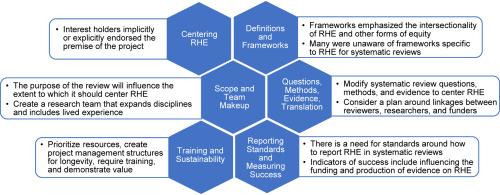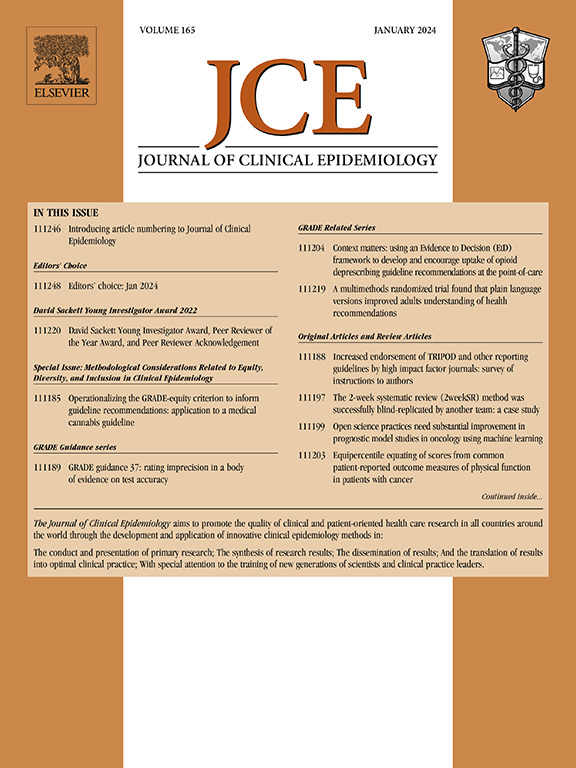以系统性综述中的种族健康公平为中心论文 2:半结构式访谈的主题。
IF 7.3
2区 医学
Q1 HEALTH CARE SCIENCES & SERVICES
引用次数: 0
摘要
目的:在种族健康不平等现象严重且持续存在的背景下,我们试图了解如何在系统性综述中定义种族健康平等,以及如何配备人员、开展、传播、维持和评估解决种族健康平等问题的系统性综述:研究包括虚拟半结构化访谈,然后使用 NVivo 进行结构化编码和定性分析:29 人参与了这项研究,他们主要来自美国,包括患者、社区代表、系统评审员、临床医生、指南制定者、初级研究人员和资助者。这些利益相关者在提出种族健康公平概念时,提到了权力系统、不公正、健康的社会决定因素以及交叉性。他们还强调要让有生活经验的社区成员加入评审团队。他们建议改变系统性审查的范围、方法和合格证据(如调整审查方法,将种族健康公平因素纳入审查主题的优先排序、关键问题的制定和搜索,以及具体的结果),并扩大证据范围,纳入解决实施和获取问题的设计。兴趣持有者指出,持续努力将种族健康公平作为系统性综述的中心需要资源、时间、培训以及向资助者展示价值:利益相关者确定了系统综述在资金、人员配备、开展、传播和实施方面的变化,以种族健康公平为中心。这些步骤的实施需要明确的成功标准、支持变革的证据基础以及利益相关者对前进方向的共识。本文章由计算机程序翻译,如有差异,请以英文原文为准。

Centering racial health equity in systematic reviews paper 2: themes from semistructured interviews
Objectives
In the context of profound and persistent racial health inequities, we sought to understand how to define racial health equity in the context of systematic reviews and how to staff, conduct, disseminate, sustain, and evaluate systematic reviews that address racial health equity.
Study Design and Setting
The study consisted of virtual, semistructured interviews followed by structured coding and qualitative analyses using NVivo.
Results
Twenty-nine individuals, primarily United States–based, including patients, community representatives, systematic reviewers, clinicians, guideline developers, primary researchers, and funders, participated in this study. These interest holders brought up systems of power, injustice, social determinants of health, and intersectionality when conceptualizing racial health equity. They also emphasized including community members with lived experience in review teams. They suggested making changes to systematic review scope, methods, and eligible evidence (such as adapting review methods to include racial health equity considerations in prioritizing topics for reviews, formulating key questions and searches, and specifying outcomes) and broadening evidence to include designs that address implementation and access. Interest holders noted that sustained efforts to center racial health equity in systematic reviews require resources, time, training, and demonstrating value to funders.
Conclusion
Interest holders identified changes to the funding, staffing, conduct, dissemination, and implementation of systematic reviews to center racial health equity. Action on these steps requires clear standards for success, an evidence base to support transformative changes, and consensus among interest holders on the way forward.
求助全文
通过发布文献求助,成功后即可免费获取论文全文。
去求助
来源期刊

Journal of Clinical Epidemiology
医学-公共卫生、环境卫生与职业卫生
CiteScore
12.00
自引率
6.90%
发文量
320
审稿时长
44 days
期刊介绍:
The Journal of Clinical Epidemiology strives to enhance the quality of clinical and patient-oriented healthcare research by advancing and applying innovative methods in conducting, presenting, synthesizing, disseminating, and translating research results into optimal clinical practice. Special emphasis is placed on training new generations of scientists and clinical practice leaders.
 求助内容:
求助内容: 应助结果提醒方式:
应助结果提醒方式:


